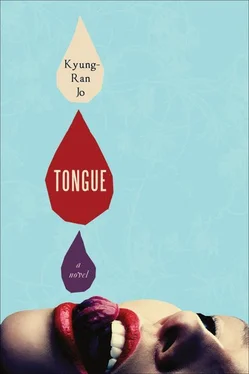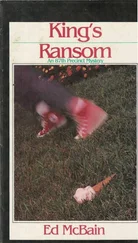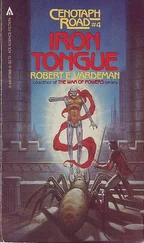A list of happiness.
Is that even possible? I look out the picture window as people come into Nove, study the menu, look toward the kitchen in anticipation of the food, stare into each other’s eyes across a vase with a single violet in it. Nobody is silent in a restaurant. Everyone is smiling or talking or eating. Maybe the table was the birthplace of language. A repetitive gathering place for meals and routine activities is conducive to talking, to conversations. Food goes into a mouth and words come out of it, just like a door. Talking and tasting, expressions of desire, happen in the mouth, on the tongue, and the mouth is the entrance to our bodies, revealing who we are.
The restaurant is filled with upbeat, happy chatter. Red lips, swollen in expectation of warm food and words, float, cloudlike. People move closer, whispering secrets and eating and feeding one another food. When you whisper and eat, the tip of your tongue, glistening with saliva, peeks out, sparkling like a red jewel. If you touch the roof of your mouth with your tongue and sing, lalalala , your bones vibrate with the sound. This gleeful clamor erupts when you eat something delicious.
Now I remember the cookbook I wanted to write—food that brings positive change, the vivid sensations and tastes and textures of my youth, the scents of memories and the stories behind them. Once I wanted to write a book similar to Chef’s. Back then, I whispered and talked and ate and drank and laughed like all the others. I sat close to friends in small circles, like winter bees trying to survive the cold. Am I certain we loved each other? Happiness comes through the mouth, but the mouth is also the doorway through which it walks out. If you lock the door to your body from the inside, the inner darkness traps you. If you’re the kind of person who doesn’t keep promises, the mouth is merely a dark, lightless cave.
I OPEN MY FRONT DOOR and Mun-ju pokes her head out from behind the pocket door. I pause, taken by surprise. It’s been a long time since someone greeted me when I got home. In January, when I was in bed for ten days, Mun-ju wrote down the contact information for the hospital Uncle was in and made a copy of my keys, saying, So this won’t happen again. I’m not bedridden anymore but something in me is shattered. Even if something disappears it isn’t completely gone. After Paulie’s death I’ve become more attuned to sound. I’m not scared by big noises, like the sound of thunder or lightning or fireworks. But the sound of rain coasting down the windows, the door closing, the fridge whirring, a few grains of rice falling to the floor, my own breathing—I feel those more immediately than the pounding of a drum. And the sounds I hear—Paulie’s slow footsteps, his sniffing, his breathing. One night, when Paulie’s death finally sank in, his sounds wounding me, I had to stifle my moans. Paulie used to give a single bark when the wind rustled the leaves, when he sauntered into the yard, when I brushed my teeth, when the blender was whirring, when I was grinding coffee beans. I keep brushing my teeth even after they’re clean, in the darkness, to feel Paulie coming up to me and pressing his wet nose on the back of my knees. Yeah, I remember. We shared something deep, something fundamental. Right, Paulie?
Now I run alone on the track at night.
Everything in this world, including those long dead, makes noise. But I can’t tell even Mun-ju that Paulie runs next to me, his teeth suppressing his panting.
“Exercise is fine and good, but not right before you sleep.”
“It was always at this time.”
“What?”
I stay quiet.
“Oh, right. That’s true.” Mun-ju nods.
I get up and boil water and steep some lavender. We sit on the sofa, side by side. Mun-ju has just returned from a week in Venegono Superiore, a small town about an hour from Milan, for a special feature about slow food. If you take the train from there and travel south for two hours, you arrive in Tuscany. The last time I went to Italy through Nove’s program, I learned how to butcher pigs and cattle, observing butchers for three weeks. It was a unique chance, but when the most renowned butcher in the region pulled out the backbone of a pig lying on its side, with a flourish, I let out a surprised shriek, so I lost the opportunity to learn more. The butcher’s glare was cold and jagged, reproachful. The way Chef looked at me if I made a mistake at the chopping block as a novice.
“Are you already done with the article?”
“The issue’s already out. But it’s not that interesting.”
“What isn’t?”
“This slow-food movement.”
“Didn’t it come from the desire to live at a slower pace?”
“Yeah. You ride a bike instead of driving a car, you take naps in the afternoon, and you cook the fruit and vegetables from your garden.”
“What’s wrong with that?”
“You have too much time to think.”
“You don’t like that?”
“A happy person doesn’t have that much to think about.”
We laugh. A bitter laugh, as if to acknowledge that we are far from being happy.
“How are things?” Mun-ju asks.
“Fine, I guess.”
“I stopped by Nove yesterday afternoon for a cup of tea but you weren’t there. Where were you?”
Yesterday afternoon I met Mr. Choe at the Shilla Hotel café. “He asked if I wanted to move to a different kitchen.”
Mun-ju doesn’t know what I’m talking about.
“He’s going to open a restaurant.”
“Chef is opening another one?”
“No, Mr. Choe.”
“Mr. Choe from Mido?”
“Yeah.”
“So is he scouting you?”
I don’t answer. Was that what he meant? Mr. Choe said that he was going to renovate a two-story wine bar into an Italian restaurant. The location is great and so is the salary he mentioned, much more than what I make at Nove. He said that I would be sent overseas to learn about food for one month every year. Every cook who starts the day peeling hundreds of potatoes wants this, and, unless your dream is to run your own restaurant, this is the best—and rarest—opportunity. I smiled at Mr. Choe. He said, We should keep this quiet from Chef for the time being. He wetted his lips and added, When you get to my age, you start wanting a cook. Your own cook.
A chef prefers customers that keep him on his toes. You ignore the customer who orders steak well-done or the person who asks for chicken. People who don’t know what they’re eating order chicken at Italian restaurants. Those who eat well-done steak don’t appreciate the taste of meat. Gourmets want something that’s not on the menu. They eat only plump Cornish hens or castrated roosters or the choice parts of a whole roasted duck. They want swan, as if it’s the eighteenth century. They understand that taste is triggered by the sense of touch, through the lips, and they want to have a mouth longer than the beak of a crane, to enjoy the ecstasy of food sliding down to their intestines. Cesare Ripa’s Crapula satirizes the fat stomachs and crane necks of extreme pleasure seekers. Food lovers ignore even death threats when it comes to something they want to eat. The possibility of death is why gourmets love blowfish. If you put a thin piece of blowfish—sliced so thin that the cook’s fingerprint is visible—in your mouth, your lips redden and heat up and tremble from the fear and excitement of death. Your spirits rise and saliva pools in your mouth. Finally a childlike smile spreads across your face.
The obsession over food is tenacious. The eighteenth-century writer Nicholas-Thomas Barthe, who wrote Les Fausses Infidélités , had the habit of eating everything on the table. Barthe did not have good eyesight and was fearful that he wouldn’t be able to see all the food and might miss some of it. He would hound his servants, asking, Have I eaten this? Have I eaten that? He died from indigestion. King Darius, who liked beef, put up curtains to hide from the others as he ate an entire cow. Balzac, a coffee addict, drank forty to fifty cups a day and died of gastritis. The philosopher Democritus, upon realizing that his life was coming to an end, deprived himself each day of one food until there was only a jar of honey left. He stuck his nose in the jar and smelled the honey, and as soon as the jar was taken away, he died, at the age of 109.
Читать дальше












